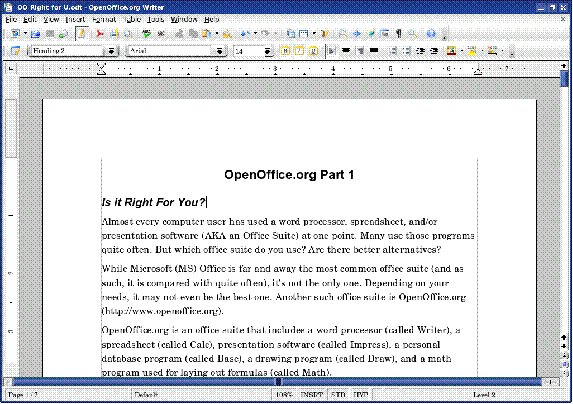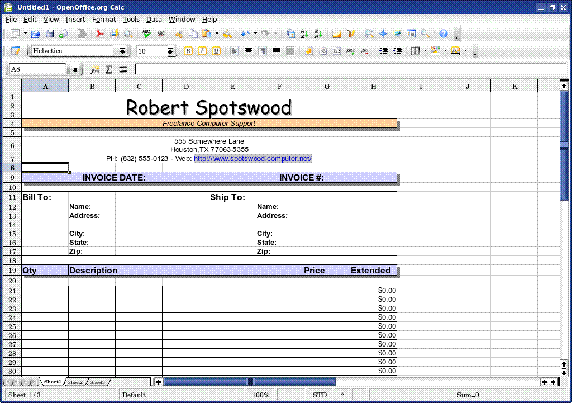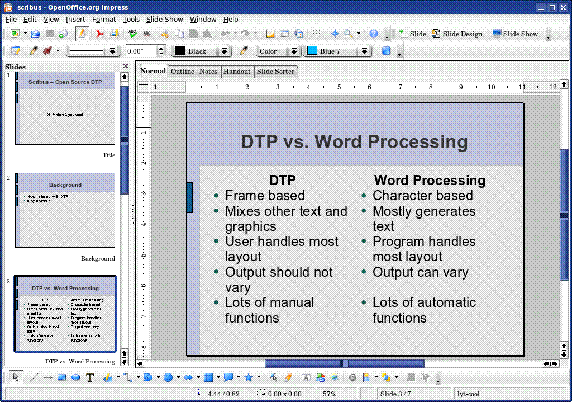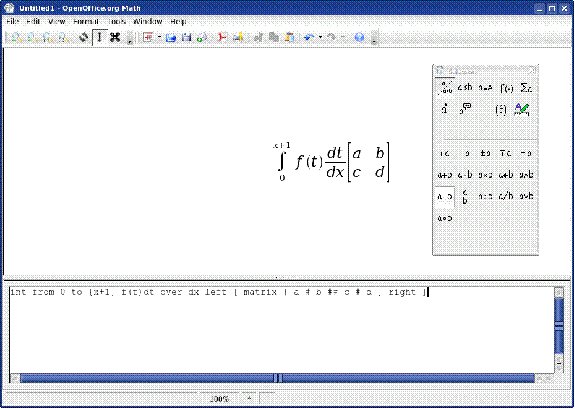OpenOffice.org Demystified - Part 1
Robert Spotswood
Is it Right For You?
Almost every computer user has used a word processor, spreadsheet, and/or presentation software (AKA an Office Suite) at one point. Many use those programs quite often. But which office suite do you use? Are there better alternatives?
While Microsoft Office (MS Office) is far and away the most common office suite (and as such, it is compared with quite often), it's not the only one. Depending on your needs, it may not even be the best one. Another such office suite is OpenOffice.org (www.openoffice.org).
OpenOffice.org is an office suite that includes a word processor (called Writer), a spreadsheet (called Calc), presentation software (called Impress), a personal database program (called Base), a drawing program (called Draw), and a math program used for laying out formulas (called Math or Formula).

Figure1: OpenOffice.org Writer

Figure 2: OpenOffice.org Calc

Figure 3: OpenOffice.org Impress

Figure 4: OpenOffice.org Math/Formula
Cost
The entire OpenOffice.org suite is available for free from their site, even for commercial use. It is not a crippled version of the full suite. It is the full suite! There are no ads or spyware that come with the program. The registration is optional and there are no nag screens about it. Updates to the program are also free.
Compare $0 (free) with MS Office 2003 Standard Edition (which does not include a database program) which runs upwards of $250 per copy for the least restricted version. MS Office 2007 is similarly priced per copy.
Note the phrase “per copy”. MS wants those prices for each copy you use. Have 3 computers? Then MS wants around $750. OpenOffice.org, on the other hand, allows you to install the program on as many computers as you want at no additional charge. You can even give, or sell, copies of OpenOffice.org to others legally without paying any royalties.
Yes, some people acquire MS Office for “free”, but the price is either built into the price of their computer, and therefore hidden from them, or they are committing a felony. With MS stepping up their anti-piracy efforts, this felony is getting harder to do, and there is always a chance, much greater for businesses than home users, of getting caught. Penalties can include statutory damages ranging from $250 to $150,000 for each infringing copy, or higher if the court feels that the infringement was committed "willfully." There are also criminal penalties including jail time.
Cracked version of MS programs, including MS Office, that can be found on the Internet may seem tempting, but they often contain various pieces of malware. Why risk this if you don't have to? With OpenOffice.org, everyone in your organization, even those who work at home, can have the same version of the software without worrying about cost, legal issues, or little hidden “presents”.
File Format
By default, OpenOffice.org uses an ISO standard (ISO/IEC 26300:2006) OpenDocument format, often abbreviated ODF. This is a fully-documented, royalty-free standard that anyone can use at no cost, even Microsoft. Any software program can use the format. Already, the following programs use ODF:
* OpenOffice.org
* StarOffice
* KOffice
* TextMaker
* IBM Workplace
* Google Apps
* Scribus (import text files only)
The OpenDocument Fellowship has a more complete list at “opendocumentfellowship.org/applications”. MS, Sun, and several other parties are creating free plug-ins that will allow MS Office to read and write ODF files. The MS plugin (sourceforge.net/projects/odf-converter) is reported to work better than the Sun plugin (www.sun.com/software/star/openoffice/), for now.
Why is file format important? By using an open, well-documented standard, you prevent vendor lock-in. Vendor lock-in occurs when there is some aspect of a program, usually the proprietary file format, that makes those wanting to move to another vendor/program incur substantial switching costs, real and/or perceived. If you have to re-create a lot or all of your data by hand, switching to another program is hard. Vendors, e.g. Microsoft, like vendor lock-in as most customers will feel it's cheaper (at least in the short run) to put up with them, and continue paying, rather than switch.
The old MS Office formats, such as doc, xls, and ppt, are not true standards, despite their widespread use. For other programs to use them, the developers have to reverse-engineer the formats in order to work with those files, in addition to dealing with any patent issues that loom over any such implementation, or pay hefty licensing fees to Microsoft. Various vintages of MS Office file formats, while looking very similar, are not 100% compatible with each other. A file created in MS Office 97 may or may not open correctly in MS Office 2007, for example.
Your author has personally encountered a situation where a company has had to install two versions of MS Office (97 & 2003) on one computer because word documents prepared in one version would not display properly in the other version.
The point is that it's in our best interest to use open formats. MS gets the job done *today*, but at the cost of placing our trust in a notably untrustworthy company. They can change the format and force us all to upgrade to maintain the ability to semi-freely access and exchange our data with each other. MS can change the rules at any time. Or they could just get out of the word processing business altogether, leaving us high and dry. It is a very bad idea to stockpile large volumes of information in formats that we don't control.
OpenOffice.org can read and write MS Office files up to Office 2003 (file filters for the Office 2007 format are expected be ready in autumn 2007). However, the filters are not perfect. For all but the more complex documents, they usually work fine, although some small formatting changes are occasionally necessary. Sometimes they will even open MS Office files that even MS Office can't (due to a small amount of file corruption). This alone can make having a copy of OpenOffice.org worth it.
If Microsoft, with full access to all the documentation, source code, and billions of dollars, can't make the MS Office file formats compatible with each other, even though they are supposed to be, can you really hold it against other applications for having not quite perfect file filters? Further, MS Office 97-2003 compatibility mode in MS Office 2007 has three different meanings in Excel, PowerPoint, and Word, and the one in Excel prevents documents with "new features" from being saved to a file that can be edited by a previous version of Excel (s3.amazonaws.com/ppt-download/office-2007-compatibility-mode-confusion4793.pdf). You can select an earlier format, but then it saves as read-only.
Microsoft has countered the ODF standard by proposing their own, OOXML. However, even after bribing companies to vote for their standard (www.pcworld.com/article/id,136627-pg,1/article.html; makes one wonder how good the proposed standard must be if you have to bribe people to vote for it???), Microsoft will not commit to supporting the standard. According to Brian Jones, a Microsoft manager who has worked on OOXML for six years: “It’s hard for Microsoft to commit to what comes out of Ecma [the European standards group that has already OK’d OOXML] in the coming years, because we don’t know what direction they will take the formats. We’ll of course stay active and propose changes based on where we want to go with Office 14. At the end of the day, though, the other Ecma members could decide to take the spec in a completely different direction. ... Since it’s not guaranteed, it would be hard for us to make any sort of official statement.” (www.techworld.com/storage/features/index.cfm?featureid=3685&pagtype=all).
Features
So how does MS Office compare with OpenOffice.org on features? According to Linux Insider, OOo "...will perform 98 percent of corporate tasks with no problem, and both suites are only improving..." (www.openoffice.org/servlets/ReadMsg?list=announce&msgNo=233; original story no longer available on-line). A comparison of OOo 2.0 Writer (beta) vs. MS Word 2003 (software.newsforge.com/software/05/06/14/2137222.shtml?tid=152&tid=93) tested power user features. OOo won in 7 out of 12 categories and tied in 2 other categories. According to PC Pro (www.pcpro.co.uk/reviews/80012/openoffice-2.html), “the two [OpenOffice.org and MS Office] are now all but neck and neck on features.
Near the beginning of 2007, the European Union (EU) Commission issued a report, “Study on the Economic impact of open source software on innovation and the competitiveness of the Information and Communication Technologies (ICT) sector in the EU” (ec.europa.eu/enterprise/ict/policy/doc/2006-11-20-flossimpact.pdf for those with insomnia, www.groklaw.net/article.php?story=20070112025016466 for those without insomnia). In preparing this report, six public and private organizations that have transitioned to Open Source Software (OSS) were studied. OpenOffice.org is considered OSS, and the study reports, “Our findings report no particular delays or lost of time in the daily work due to the use of OpenOffice.org.... OpenOffice.org has all the functionalities that public offices need to create documents, spreadsheets, and presentations."
If you are willing to spend a little time learning how to use OpenOffice.org, you will suffer very little, if at all, from lack of features. In return, you will gain access to new features and more powerful features that MS Office lacks.
There are very few features MS Office has that OpenOffice.org does not have. These features do differ however, and will probably require some training to get the most out of the program, but, as the EU report mentions, “Costs to migrate to an open solution are relevant and an organization needs to consider an extra effort for this. However these costs are temporary and mainly are budgeted in less than one year.” As the interface of MS Office 2007 is very different from previous versions, those looking to upgrade their aging MS Office software are going to need some training anyway, so this isn't the disadvantage for OpenOffice.org it may seem at first glance.
One feature that OpenOffice.org offers that MS can not offer is the range of operating systems it works on. MS Office works on Windows and Mac. OpenOffice works on Windows (98 to Vista, although officially 98 is unsupported), Linux, Mac, BSD, and Solaris. With MS Office, you must buy an operating system. With OpenOffice.org, you don't have to unless you want to.
Another feature OpenOffice.org offers that MS Office does not in versions prior to 2007 is the ability to export directly to PDF (in 2007 there is a plug-in you must add). Now some of you might be thinking, “Well, I can accomplish the same thing by installing PDFCreator or one of dozens of similar programs.”, and if you don't care about the quality, you are correct. The word quality here refers to the little extras that make it better, not how good it looks on screen or prints. With OpenOffice.org, the PDF file isn't a collection of pictures, but proper output. This means you extract the text from the PDF if needed. Searching for text, hyperlinks, table of contents, and security features are all available with OpenOffice.org-generated PDFs, but you don't have any of those things with PDFCreator (or similar programs).
For those looking for a more in-depth comparison of features, the OpenOffice.org community has written some migration guides to help with the switch from MS Office. These are available free at “documentation.openoffice.org/manuals/oooauthors2”, at the bottom of the page. The Official manuals are also on this page, so you can certainly look through them to help you decide if OpenOffice.org is right for you.
OpenOffice.org can live along side of MS Office on the same computer, so you don't have to delete your installation of MS Office to try OpenOffice.org. The biggest problem people running Windows have with that setup is during the install, OpenOffice.org offers to become the default application for doc, xls, and ppt files. If you accept its offer, double-clicking on such a file will then open the file in OpenOffice.org, not MS Office. Uninstalling OpenOffice.org will not fix this, but this can be fixed by going to Start | Run and typing “winword /r” (without the quotes), then repeating the process for Excel and Powerpoint (“excel /regserver”, and “powerpnt /regserver”).
Outlook
OpenOffice.org does not include an email client like MS Office does, namely Outlook. Of course, some feel with all the security problems Outlook has, it should be named LookOut, so the lack of such a program isn't really a drawback.
If you don't need the calendar, Thunderbird works very well. To integrate your Thunderbird address book with OpenOffice.org (since at least version 2.0.2), at the top menu bar of OpenOffice.org, Click File/Wizards/Address Data Source. A pop-up will appear asking different types of data sources. Specify Thunderbird as a data source and follow the prompts. Your address book is now accessible from OpenOffice.org
If you require a calendar feature, or just like how Outlook works, try Evolution (www.gnome.org/projects/evolution/ ; shellter.sourceforge.net/evolution/ for a Windows version). With options such as Thunderbird, Opera, KMail, Evolution, and several others, many of the developers of OpenOffice.org feel there is little need to spend the resources on re-inventing the wheel. It's better to spend the time improving their own applications.
People OpenOffice.org is Wrong For
Despite all its benefits, OpenOffice.org isn't right for everyone. If you can't live without the outline view MS Word provides, stick with MS Office. Similarly, if you have a lot of work, or money, invested in VBA macros, stick with MS Office. OpenOffice.org does have its own language, Star Basic, but it's not compatible with VBA. There is a project underway by Sun and Novell to add VBA support to OpenOffice.org, but according to the website, “It is expected that many macros won't run for now.”
For those with a considerable investment in Access databases, OpenOffice.org may not be the best choice (see vendor lock-in above). While the tables can be migrated to Base (or another database, such as MySQL or Postgres) relatively easily, nothing else can. Of course, since MS Office and OpenOffice.org can coexist, you can always keep MS Office around just for Access and use OpenOffice.org for word processing, spreadsheets, and presentations.
If you are looking for lots of templates and clip art that come with your office suite, OpenOffice.org isn't a good choice. However, OxygenOffice Professional (sourceforge.net/projects/ooop/) has a collection of templates and clip art that works with OpenOffice.org. In fact, OxygenOffice is OpenOffice.org with the extras already added in. There are also other OpenOffice.org documents posted around the web you can always find and use templates at places such as:
If you work for a company that has, and actually enforces, rules forbidding users to install extra software, OpenOffice.org might not be a viable choice for you. At companies lacking such rules, there are people that use OpenOffice.org while the rest of the office uses MS Office without any real problems, other than remembering to save files in MS Office format before handing them off to others. In fact, OpenOffice.org can be set to default to MS Office formatting.
Finally, OpenOffice.org may not be the best choice for those who can't or refuse to learn. There are those out there that, rather then spend the time and effort to learn and improve, will instead look for some small thing that MS Office can do which OpenOffice.org can't do as well. They then declare OpenOffice.org inferior or unsuitable while overlooking all the things OpenOffice.org does better. If you are one of those people, don't bother trying OpenOffice.org.
Conclusion
For most users, OpenOffice.org is more than a viable replacement for MS Office. Considering it's free, you only have a little time and hard drive space to lose in trying it out. You might even learn something in the process.
In Part 2 of this series, I will cover getting and installing OpenOffice.org.
Robert Spotswood, a HAL-PC member, is active in the Linux SIG and a freelance computer professional. He can be reached at robert@spotswood-computer.net.
|

